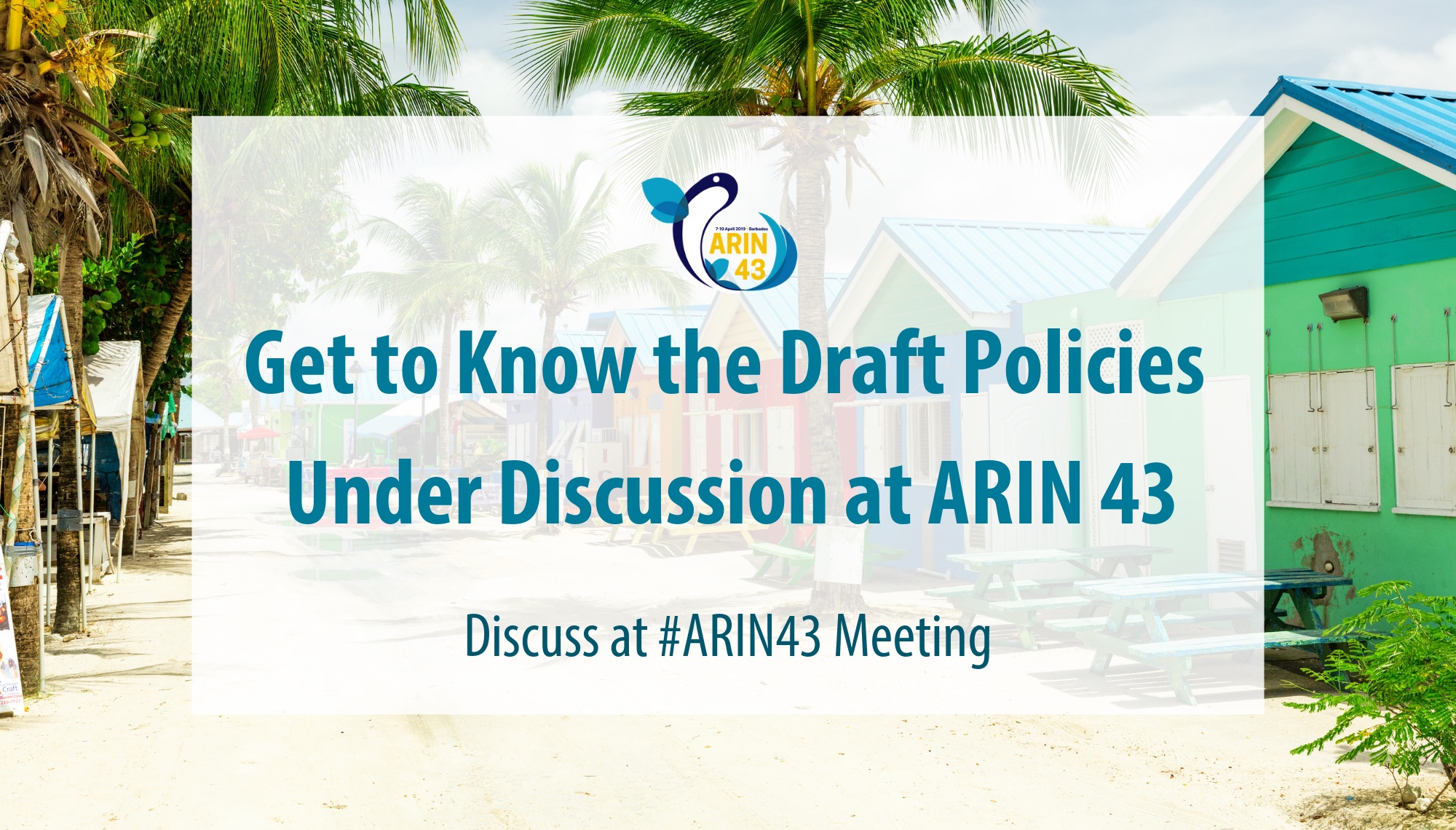
Get to Know the Draft Policies Under Discussion at ARIN 43
With ARIN 43 fast approaching, we are excited to bring our community together and facilitate one of ARIN’s prime directives: the development of policy by the community for the management of IP addresses and Autonomous System Numbers. Our biannual Public Policy and Members Meetings are the cornerstone of our Policy Development Process (PDP), and they rely upon you, the community, to be successful.
To help newcomers and seasoned veterans alike, below is a look at the Draft Policies and Recommended Draft Policies up for discussion. I have provided a simple explanation of each policy to help you determine those of greatest interest to your organization and where you might want to spend more time catching up on prior discussions.
Recommended Draft Policies
ARIN-2017-12: POC Notification and Validation Upon Reassignment or Reallocation
ARIN-2017-12 requires ARIN to identify and contact organizations and their related points of contact as part of a request for reallocation or detailed reassignment of address space.
ARIN-2018-2: Clarification to ISP Initial Allocation
ARIN-2018-2 adjusts IPv4 initial allocation policy to allow organizations without direct allocations, direct assignments, re-allocations or reassignments to qualify for up to a /24 automatically, and larger if they document how they will utilize the space.
ARIN-2018-5: Disallow Third-party Organization Record Creation
ARIN-2018-5 requires organizations to directly request the creation of their Organization Identifier (OrgID) record, and disallows third parties to request one.
Draft Policies
ARIN-2018-6: Clarify Reassignment Requirements in 4.2.3.7.1
ARIN-2018-6 specifies that only a customer’s name is required for reassignments, and POC information only if requested by the customer, or if the address space will be routed and announced outside the provider network of that customer.
ARIN-2019-1: Clarify Section 4 IPv4 Request Requirements
ARIN-2019-1 adjusts Unmet Requests language to specify its application to IPv4 address space only, and disallow IPv4 allocations to organizations that have recently transferred address space to another party.
ARIN-2019-2: Waiting List Block Size Restriction
ARIN-2019-2 adjusts Unmet Requests language to limit allocations to a /22 or smaller.
ARIN-2019-3: Update 4.10 – IPv6 Deployment Block
ARIN-2019-3 adjusts allocation language concerning the dedicated IPv4 block to facilitate IPv6 deployment, raising the minimum size to a /24 and limiting total amount an organization can receive to a /21.
ARIN-2019-4: Allow Inter-regional IPv6 Resource Transfers
ARIN-2019-4 includes IPv6 addresses in the list of resources allowed to be transferred between ARIN and RIRs that share reciprocal, compatible needs-based policies.
ARIN-2019-6: Longer Hold Time Requirements for 4.1.8 Recipients
ARIN-2019-6 increases the wait time between IPv4 Unmet Requests allocations from 12 to 24 months.
ARIN-2019-7: Elimination of the Waiting List
ARIN-2019-7 removes the waiting list for unmet IPv4 requests and replaces it with an auction procedure to be administered by ARIN and its Board of Trustees.
Participate in Policy Discussions
ARIN is committed to providing an open community forum for policy development, and that includes lowering barriers of entry of all kinds. New faces and widespread participation are key components in any Regional Internet Registry community, and ARIN is no exception. I hope the information in this post arms even the greenest ARIN participant with the tools they need to participate actively once the microphones turn on.
People from all over the ARIN region and beyond will be participating at the ARIN meeting, but vital opinions need not be conveyed in-person to be effective! If you want a great time- and wallet-friendly option for you and your organization to be heard by the ARIN community, ARIN offers a terrific remote participation experience. We’ll have chat rooms for voicing your opinions during discussions, as well as a live streaming transcript so you won’t miss a beat!
Remote participation is completely free, but be sure to register early! We are using Slack for ARIN 43, and all remote participants will be sent an invitation to create an account to access meeting chat. For details, visit the Remote Participation page. Note that all remote participants are subject to the Remote Participation Acceptable Use Policy (AUP).
The ARIN Public Policy Meeting and Members Meeting will be webcast, including discussion sessions for all ten of the above Draft Policies. Once the Public Policy Meeting begins, we make every effort to ensure that policy discussions are held at their scheduled times, and we notify remote participants in the event of agenda changes. Check the meeting agenda for complete schedule details.
To submit your very own Internet number resource policy proposal, just fill out our brief template and send it to policy@arin.net. Don’t worry about getting the wording of your proposal exactly right – our Advisory Council will work with you directly to help transform your idea into a clear change, removal, or addition to policy text, and get it the community attention it needs to move through the PDP.
If you’re more of a visual learner, check out our video entitled “ARIN’s Policy Development Process” to learn more about each step of the PDP, and become a part of the Internet’s future today!
Additional resources can be found on the following webpages:
We look forward to seeing you there!
Recent blogs categorized under: Public Policy
GET THE LATEST!
Sign up to receive the latest news about ARIN and the most pressing issues facing the Internet community.
SIGN ME UP →Blog Categories
ARIN Bits • Tips • Updates • Elections • Caribbean • Outreach • Security • RPKI • Public Policy • Guest Post • Grant Program • Fellowship Program • Data Accuracy • IPv6 • Business Case for IPv6 • Internet Governance • Training • IPv4 • Customer Feedback • IRR


